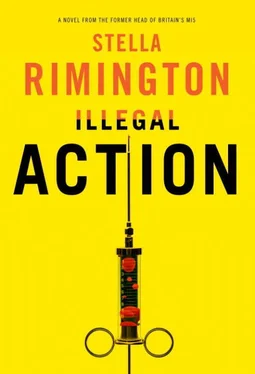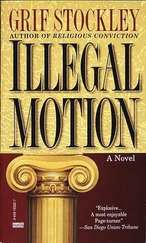Peggy rang the office of Private Collection in Hanover Square. “Miss Darnshof is unavailable,” said a tired, Sloaney voice over the phone.
“Will she be available later on?”
“I’m afraid I don’t know,” said the voice, this time audibly suppressing a yawn.
“Well, is she in town? I’m an old friend from Denmark,” added Peggy, wishing she’d thought of this in time to add a slight accent. “I’ll ring her flat—unless you think she’s gone to Ireland.”
“I don’t know if it’s Ireland, but she was flying somewhere.” The Sloane seemed to wake up at last, and regret her indiscretion. “What did you say your name was?”
“Thanks very much,” said Peggy, and after this non sequitur put down the phone, suddenly feeling sick at the thought of Greta Darnshof in Ireland. If anything happens to Liz, she thought with sudden helpless anger, I hope they hang Brian Ackers up from a lamp post on Millbank.
Why didn’t Liz ring? She must have landed by now. Perhaps she couldn’t find a private place to make a call, but Liz would always find some way to keep in touch. She tried to still the racing thoughts in her head, stretched both arms out and took a few deep breaths to keep her circulation flowing. Pushing her glasses firmly up her nose, she reminded herself that sometimes the answer was so obvious you ignored it. What obvious thing had she missed?
Suddenly, for no apparent reason at all, she remembered that even a private plane had to file a flight plan. A few phone calls got her to Northolt, then a brief argument, another call to the airport police, and eighteen minutes later Peggy was staring at the faxed copy of Brunovsky’s itinerary. Then she rang O’Farrell of the Garda again.
“You say Shillington airport?” he said when she’d explained. “That would make sense. It’s new, about thirty miles west of Cork. Small but with a long enough runway to take private jets. It gets a lot of use from the money that’s been coming into Cork by the coast. Do you want me to send someone there to pick her up?”
And then Peggy looked at her watch and with a sinking feeling realised it was too late. Liz would have landed by now. Brian Ackers had told her to play it low-key with the Garda. “We don’t want to cause an unnecessary international incident,” he’d said. She decided to disobey him.
By the time she had given an astonished O’Farrell a version of what she thought was going on, he had agreed to send two officers to meet Michael Fane, now en route to Heathrow, when he landed at Cork airport. Then they would take him to… where? Peggy hoped that by then she would have been able to make contact and would know where Liz had gone.
She thanked O’Farrell, agreed to keep in close touch, hung up, then picked the phone up again.
Your call has been forwarded to the voicemail service.
We will be landing at Cork in twenty minutes.” Michael Fane did up his tie and ran a comb through his hair. It wasn’t that he was expecting the Garda officers meeting him to be particularly spruce, but they’d be looking to him to lead and he was determined to be authoritative.
He wondered if they would be armed. I hope so, he thought a little nervously, recalling Brian Ackers’ warning. Brian had kept stressing the possible danger Liz might be in, yet seemed perfectly happy to be chucking Michael into the middle of it.
Not that Michael could complain. When Brian had summoned him, he had assumed, despite Liz’s assurances, that he was going to be reprimanded for his surveillance of Ivanov. Brian had looked furious—red in the face, his eyes darting about unnervingly. But Michael quickly discovered that Brian’s agitation had nothing to do with him, and he was so relieved that at first he didn’t take in what he was being told to do.
“You’re to go to Ireland right away,” Brian said at once. “Liz went there early this morning—we don’t know exactly where she’s gone yet. Take the first flight you can get to Cork. Peggy Kinsolving has talked to the Garda. Keep in touch with her and she’ll arrange for them to meet you. If there’s any trouble, you’re to defer to them, but otherwise they’ll look to you for direction.”
“What do I do when I get there?”
Brian looked at him as if he should have known. “Find Liz,” he said shortly. “Wherever she is, locate her and bring her back. I don’t care who she’s with or what she’s doing, you’re to remove her at once and return with her to England. Is that clear?”
It couldn’t be much clearer, thought Michael, though he could see an obvious problem. “What if she won’t come? I mean, she usually gives the orders, not me.”
“For the time being, you report directly to me. When you find her, tell her you are just a messenger, conveying my orders.”
Thanks a lot, thought Michael, but he was excited by the challenge. As he left he almost missed the tall, slim figure standing in Brian’s secretary’s office, looking through the window down into the inner atrium. As the man turned, Michael saw that it was his father.
“Hello, Michael,” said Geoffrey Fane.
His father was his usual elegant figure in pinstripe suit and silk tie and Michael, seeing him there in his boss’s office, felt the familiar feeling of inferiority and anger swell up. I don’t know what you’re doing here, thought Michael, but trust you to show up just when I’ve got something real to do at last. Here you are to muscle in on it and spoil it.
But just as the fog of all the usual emotions started to settle, he stopped long enough to cast a sideways look at Geoffrey, who was just standing there looking at him. He suddenly seemed to Michael—there was no other way to describe it—forlorn. And then, for reasons Michael could not have described or explained or even halfway understood, he saw in this bogeyman figure of a father something he had not seen before, something that had nothing to do with the figure he had created in his mind, something that instead seemed entirely, unexpectedly human .
“Dad,” he found himself saying, “I’m in a bit of a rush. I’ve got to go to Ireland.” And he paused, wondering where these words were leading, until out of nowhere new words came to him and he said suddenly, “When I get back, maybe we could have lunch.”
Geoffrey Fane looked so surprised that Michael started to regret his impetuous proposal. “Yes,” his father finally said, “I would really like that.” And he smiled, but uncertainly, awkwardly—something Michael had never seen in him before.
“I’ll ring you when I’m back,” said Michael confidently.
He basked in that feeling now, as the 737 dipped one wing and the Irish coast disappeared from view. The prospect of this trip no longer seemed so daunting. It would be an anticlimax to get sent out with such urgency, only to find there wasn’t a problem at all; part of him secretly hoped to see some action. It would be nice to have something to tell his father.
Jerry Simmons was driving them in an enormous black car which had been waiting at the tiny little airport where they had landed. A Mercedes-Benz S600, the safest car in the world, Brunovsky had boyishly declared. He wasn’t talking about road accidents. The way the back doors clunked as Jerry closed them suggested that the side panels were armour-plated. Why on earth hire an armoured car in rural Ireland? wondered Liz.
Now Brunovsky was studying some spreadsheets he had produced from his briefcase and was clearly not in conversational mode, so they travelled in silence. Liz was concentrating on the route, trying to memorise the names on the fingerposts at each crossroads. Simmons was driving fast but carefully through the thin Atlantic rain that spattered the windscreen, relying on his satellite navigation system to direct him.
Читать дальше












